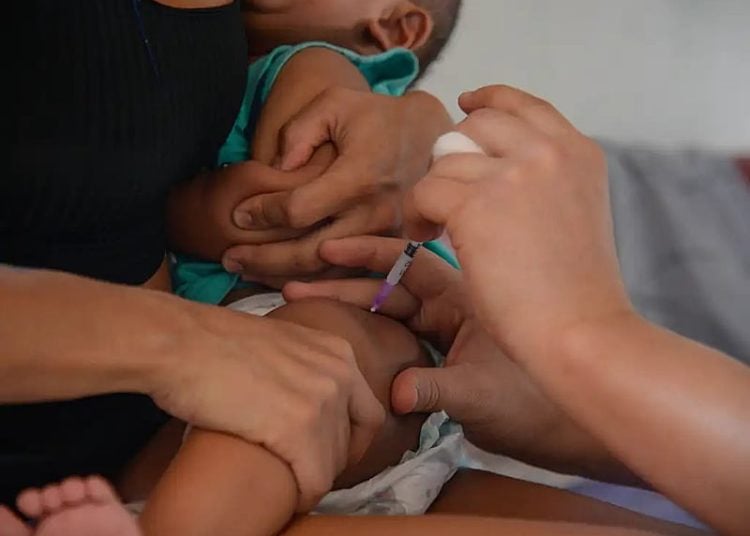After the recent arrival in Brazil of the antivax movement, diseases that had been already eliminated in the country are, once again, a threat. One of them is measles, a serious and highly contagious infectious disease that killed 136,000 people around the world last year alone, according to the World Health Organization (WHO).
In 2016, measles was eliminated in Brazil and throughout South America. However, new cases emerged in 2018, as well as the risk of being contaminated by other diseases. It happened due to the vaccination rate decrease among Brazilians, previously an example to the world, surpassing 95%. Today, it is lower than 80%, says DataSUS and the multisector platform VacinaBR.
The consequence, which Brazilian infectious disease experts had warned about, became true with the surge in measles cases, reaching its peak in 2019, when 20,901 cases were recorded. After that, the number of infections started to fall, with 44 in 2022 (the last case is from June of that year). The risk of new polio cases, a disease that can cause infantile paralysis, also became a worry 34 years after the last case was recorded.
According to Ana Lucia Paduelo, an advisor from the National Health Council, the Brazilian population became vulnerable to dormant and under-control diseases. “Those like me, who were vaccinated, never lost a friend or relative to measles, because even if we were infected – and I had measles – it didn't become serious because we were protected."
The first measure the Ministry of Health took since the beginning of the current presidential term, in January, was resuming the vaccination national campaign. Investments were announced, amounting to BRL 724 mi (US$ 148,2 mi) to combat measles in 2023, besides strengthening initiatives by the Oswaldo Cruz Foundation (Fiocruz).
With more actions put forward in states where there were higher infection rates in 2022 (Amapá, Pará, Rio de Janeiro and São Paulo), on November 22, Brazil moved from the status of “endemic country” to “pending measles verification”. The announcement was made during a meeting of the Regional Commission for Monitoring and Rechecking the Elimination of Measles, Rubella and Congenital Rubella Syndrome (CRS), promoted by the Pan American Health Organization (PAHO/WHO).
How does it work?
In Brazil, the vaccines for measles, rubella and mumps are commonly reunited in a single vaccine known as “tríplice viral”, which children receive in two jabs. Contrary to what the antivax movement says, the efficacy of vaccines is well known and their side effects are rare and low risk compared to getting infected by these diseases, explains infectious disease expert Sérgio de Andrade Nishioka, a researcher at Fiocruz Epidemiology and Health Surveillance Center.
“These vaccines, particularly the components of measles and rubella, work pretty well. Indeed, their protection lasts for decades, possibly for a whole life. However, to eradicate or interrupt measles infections, the vaccine coverage rate needs to be very high, about 95% or more, ideally,” he highlights.
The expert also emphasizes that there are standard procedures after a measles diagnosis, but they are inefficient when the vaccine coverage rate isn’t high. “There is a network that goes after cases, tries to find people who had contact with infected individuals and vaccinates them, as well as the entire neighborhood to prevent the disease from spreading. But this ends up being useless when there is a lack of control,” he points out.
Vaccination setbacks under the previous government
If Brazil was considered an example in the world in vaccination, little by little it was being abandoned, particularly with the arrival of antivax ideas. The movement is against science and was supported by former President Jair Bolsonaro (Liberal Party), a staunch critic of COVID-19 vaccination, a disease that killed over 700,000 people in the country.
To Ana Lucia Paduelo, the constant criticisms and the government’s ill will to buy the COVID-19 vaccines, coupled with the suggestion of inefficient treatments such as chloroquine, opened the door to demoralizing all vaccines. “Doubts were introduced into people's minds. I saw poor people, but also well-educated individuals with master's degrees and PhDs, refusing to vaccinate their kids. The doors were open to disqualifying vaccines in Brazil as a whole. Now, we are dealing with the consequences of it, which is an even higher decrease in vaccinations," she points out.
The finding that there was “huge ill will” towards vaccination in the previous government needs to be overcome as soon as possible, Nishioka argues. He says that ideological polarization has harmed vaccination campaigns. “To keep on polarizing, saying that the previous government didn't do it [vaccination campaigns] and the current one is doing it doesn't help, because a large number of people supported the last government and end up being predisposed to refuse vaccines,” he contextualizes.
Other factors, previous to denialism, influenced the vaccination rate fall, which started at least one decade ago. One of them is the communication strategy used in vaccination campaigns, based primarily on television and non-digital approaches, something seen as deeply disadvantageous compared to the antivax wave, which arrived in Brazil through social media platforms.
The vaccination structure itself is another thing perceived as relevant, since it does not meet the needs of contemporary families. “Vaccination made in a hospital or outpatient clinic during the day isn’t suitable for women, who have more and more things to do and few hours free to take their children to vaccinate,” explained Paduello, who found that “Some things made the access to vaccination difficult and, unfortunately, the vulnerable population is certainly the most affected.”
Given the spread of disinformation about vaccines and the supposed harm they could cause, the emphasis on direct communication with the population is one of the main fronts in this battle to resume vaccination coverage. “As we have lost the state we built with hard work over decades, getting back to that point isn’t easy. But that doesn’t mean we will give up. We have to try,” says Nishioka.




